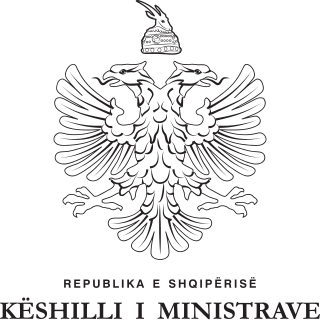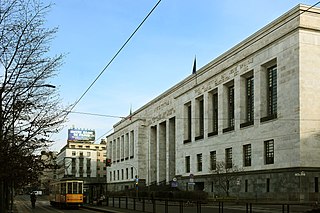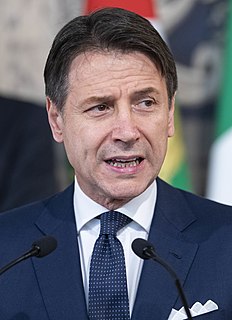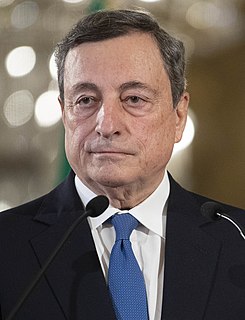Related Research Articles

The government of Italy is in the form of a democratic republic, and was established by a constitution in 1948. It consists of legislative, executive, and judicial subdivisions, as well as a Head of State, or President.

The prime minister of Lebanon, officially the President of the Council of Ministers, is the head of government and the head of the Council of Ministers of Lebanon. The Prime Minister is appointed by the president of Lebanon, with the consent of the plurality of the members of the Parliament of Lebanon. By convention, the office holder is always a Sunni Muslim.

The Council of Ministers is the main collective decision-making body of the Government of Spain, and it is exclusively composed of the Prime Minister, the deputy prime ministers and the ministers. Junior or deputy ministers such as the Secretaries of State are not members of the Council. The Monarch may also chair the Council when needed on the invitation of the Prime Minister.

The first deputy prime minister of Spain, officially First Vice President of the Government of Spain, is the second in command to the prime minister of Spain, assuming its duties when the Prime Minister is absent or incapable of exercising power. When there is only one deputy prime minister in the government, the office is referred to without the cardinal number: deputy prime minister of Spain, officially Vice President of the Government of Spain.

The Council of Ministers is a collegial executive body within the Government of Portugal. It is presided over by the Prime Minister, but the President of Portugal can take on this role at the Prime Minister's request. All senior ministers are members of the Council of Ministers, and when the prime minister finds it applicable, state secretaries can also attend its meetings.

The Ministry of Defence is the government body of the Italian Republic responsible for military and civil defence matters and managing the Italian Armed Forces. It is led by the Italian Minister of Defence, a position occupied by Lorenzo Guerini since September 2019.

The Council of Ministers is the principal executive organ of the Government of Italy. It comprises the President of the Council, all the ministers, and the undersecretary to the President of the council. Deputy ministers and junior ministers are part of the government, but are not members of the Council of Ministers.

The Dipartimento delle Informazioni per la Sicurezza is a department of the Presidency of the Council of Ministers of Italy, instituted in 2007 as part of the reform of the Italian security services. The department is part of Sistema di informazione per la sicurezza della Repubblica. It is currently headed by Elisabetta Belloni, the successor to General Gennaro Vecchione.

The Council of Ministers is the executive branch that constitutes the Government of Albania. The Council is led by the Prime Minister of Albania. The prime minister is nominated by the President from among those candidates, who enjoy majority support in the Parliament; the candidate is then chosen by the Parliament. In the absence of the prime minister, the Deputy Prime Minister takes over his functions. There are 19 other government members, serving as deputy prime ministers, government ministers or both; they are chosen by the prime minister and confirmed by the Parliament.

The Ministry of the Presidency, Relations with the Cortes and Democratic Memory (MPR) is the department of the Government of Spain which assures the link between the different Ministries and the Prime Minister and is responsible for the relations between the Government and the Parliament. This department also supports The Crown in the exercise of its functions.

The Ministry of Economy and Finance, also known by the acronym MEF, is a ministry of the Italian government. Its responsibilities include overseeing economic policy, public investments and spending. The Ministry's headquarters are located in Rome's historic Palazzo delle Finanze. The current minister in the Draghi Cabinet is Daniele Franco.

The Cabinet of Cambodia, officially known as the Office of the Council of Ministers, is the executive body of the Kingdom of Cambodia led by the Prime Minister, assisted by Deputy Prime Ministers, Senior Ministers, Ministers, and Secretaries of State. Members of the Cabinet are nominated by the Prime Minister and appointed by the Monarch.

The law of Italy is the system of law across the Italian Republic. The Italian legal system has a plurality of sources of production. These are arranged in a hierarchical scale, under which the rule of a lower source cannot conflict with the rule of an upper source.

The Renzi Cabinet was the 63rd cabinet of the Italian Republic, in office from February 2014 to December 2016. It was led by Matteo Renzi, secretary and leader of the centre-left Democratic Party (PD).

The Presidency of the Council of Ministers is the administrative structure which supports the Prime Minister of Italy. It is thus the Italian equivalent of the Prime Minister's Office. It contains those departments which carry out duties invested in the office of the Prime Minister. Duties invested in the Italian executive government generally are not administered by the Presidency, but by the individual ministries.

Adriana Vigneri is an Italian academic, lawyer and politician.

A Ministry of the Republic of Italy is an administrative organ of the Republic of Italy, placed at the top of Italian public administration and is characterised by one or more specific competencies, with an organised structure, often varying over time.

The Spanish government departments, commonly known as Ministries, are the main bodies through which the Government of Spain exercise its executive authority. They are also the top level of the General State Administration. The ministerial departments and their organization are created by Royal Decree signed by the Monarch and the Prime Minister and all of them are headed by a Cabinet member called Minister.

The Conte II Cabinet was the 66th cabinet of the Italian Republic and the second cabinet led by Giuseppe Conte. The government was sworn in on 5 September 2019.

The Draghi Cabinet is the 67th and current Cabinet of the Italian Republic, the first led by former European Central Bank President Mario Draghi. It has been in office since 13 February 2021.
References
- ↑ Mastropierro, Gaetano; Tartaglia, Angelo; Tramontano, Luigi (2007). Repertorio di giurisprudenza amministrativa 2007. Percorso storiografico degli orientamenti di diritto amministrativo (in Italian). HALLEY Editrice. ISBN 978-88-7589-296-8.
- ↑ "Normattiva". www.normattiva.it. Retrieved 2021-01-07.
- ↑ "Normattiva". www.normattiva.it. Retrieved 2021-01-07.
- ↑ "The Council of Ministers". www.governo.it (in Italian). 2019-05-29. Retrieved 2021-01-07.
- ↑ "The Council of Ministers". www.governo.it (in Italian). 2019-05-29. Retrieved 2021-01-07.